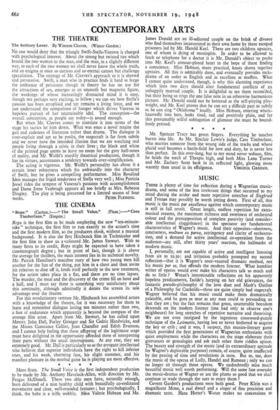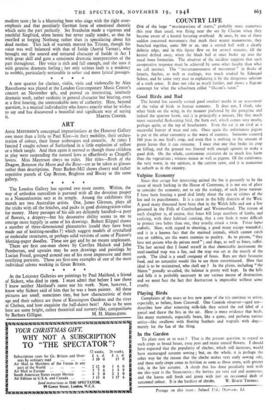MUSIC
THERE is plenty of time for reflection during a Wagnerian music- drama, and some of the less irrelevant things that occurred to my mind during the arider and more repetitive stretches of Siegfried and Tristan may possibly be worth jotting down. First of all, this music is the music par excellence against which contemporary music is still in full revolt. Great, length, endless repetition for extra- musical reasons, the maximum richness and sweetness of orchestral colour and the presupposition of complete passivity (and consider- able intellectual sluggishness) in the spectator are fundamental characteristics of Wagner's music. And their opposites—shortness, conciseness, tnultum ex parvo, astringency and clarity of orchestra- tion, and a demand for active intellectual co-operation from the audience—are still, after thirty years' reaction, the hallmarks of modern music.
I, personally, am not capable of active and intelligent listening from six to 10.30: and irritation probably prompted my second reflection—that it is Wagner's once-vaunted dramatic method, not his music per se, that offends the modern listener. What humbler writer of operas would ever make his characters talk so much and do so little ? Wotan's interminable reflections on his apparently hopeless predicaments, Isolde's harping on her old grievances, the fantastic pseudo-philosophy of the love duet and Mark's Outline of a Philosophy for Cuckolds—these are quite simply bad stagecraft. Wagner believed that his music could make them dramatically palatable, and he goes as near as any man could to persuading us that they are ; but the fact remains that gross, unutterable boredom descends on the modern listener (one had only to observe one's neighbours) for long stretches of repetitive narrative and theorising. We are not even intrigued by the ingenious crossword-puzzle technique of the Leitmotiv, having lost or never bothered to acquire the key or crib ; and it was, I suspect, this musico-literary game which provided the first generations of Wagnerian enthusiasts with quiet employment while the characters on the stage elaborate their grievances or genealogies and ask each other three riddles apiece. The beauty and strength of the music (and its extraordinary aptitude for Wagner's deplorable purposes) remain, of course, quite unaffected by the passing of time and revolutions in taste. But so, too, does the music of the operas of Luny, Handel and Rameau ; only we can no longer sit through those operas. We undoubtedly miss much beautiful music well worth performing. Will the same fate overtake the music-dramas of Wagner or are the plums so good that we shall continue to wade through the suet to enjoy them ?
Covent Garden's productions were both good. Peter Klein was a magnificent Mime, a real dwarf and a singer of fine precision and dramatic taste. Hans Hotter's Wotan makes no concessions to
modern taste ; he is a blustering bore who sings with the right over- emphasis and that peculiarly German form of emotional rhetoric which suits the part perfectly. Set Svanholm made a vigorous and youthful Siegfried, often heroic but never really tender, so that he excelled at forging Nothung rather than in speculating about his dead mother. This lack of warmth marred his Tristan, though his voice was well balanced with that of Isolde (Astrid Varnay), who brought out the soured and tortured character of Isolde in Act I with great skill and gave a consistent dramatic interpretation of the part throughout. Her voice is rich and full enough, and she uses it with genuine dramatic feeling ; her only serious fault is a tendency to wobble, particularly noticeable in softer and more lyrical passages.
• * * A new quartet for clarinet, violin, viola and violoncello by Alan Rawsthorne was played at the London Contemporary Music Centre's concert on November 9th, and proved an interesting, intensely dramatic work, rather sardonic in general character but bearing, even at a first hearing, the unmistakable note of authority. Here, beyond question, is a musical individuality who knows exactly what he wishes to say and has discovered a beautiful and significant way of saying



































 Previous page
Previous page